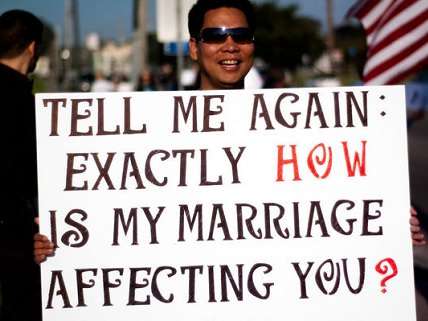What Internet Sales Tax and Gay Marriage Have in Common
Fairness should be achieved by restricting government interference, not expanding it

Utah's legislature recently considering a bill to implement an online sales tax, which failed earlier this month. Proponents, including brick and mortar stores, lobbied for the bill to "level the playing field" by requiring online sellers to collect the same sales tax stores in the real world do. Author Connor Boyack makes the libertarian case against internet sales taxes and government marriage:
Retail stores are required by the state to become tax collectors, and online stores with no physical presence in the state are not. Should the state then increase its size, reach, and tax base in the name of fairness?
Absolutely not. Equality before and non-discrimination by the law is important, to be sure. But increasing the size and scope of the state is not the proper method to fulfill that objective. As is usually the case, the opposite is true; reducing and ultimately removing the other barrier is best. Because sales taxes are an illegitimate imposition into a private commercial transaction, political pressure should be applied to repeal that mandate from existing establishments, rather than shackling those that are currently exempt.
The same situation exists in the debate over same-sex marriage. Proponents of altering marriage law in the states and at the federal level claim that prohibitions against gay marriage are unfair and discriminatory. They claim that equality before the law demands that their relationships likewise be licensed and sanctioned by the state.
As with sales taxes, the state should not be enlarged in pursuit of equality in marriage licensure. Because the government has no business being involved in marriage, the discrimination inherent in existing marriage law is best remedied by removing it altogether, or at least reducing the inequality by removing tax credits, estate planning benefits, and other incentives currently restricted to heterosexual couples whose unions are licensed by the state.
Read the rest of the piece here.


Show Comments (498)